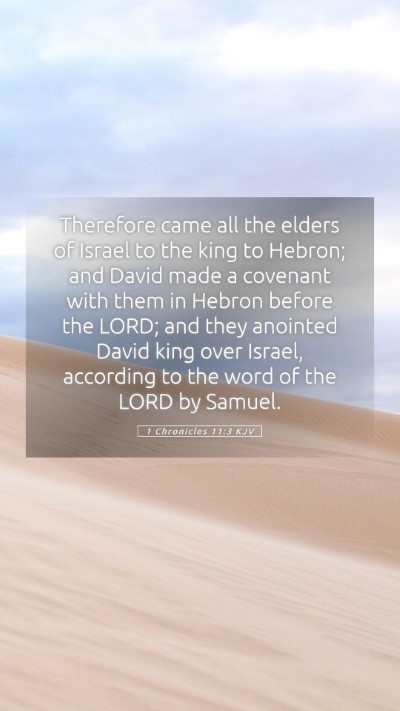Understanding 1 Chronicles 11:3
Bible Verse: 1 Chronicles 11:3 - "Therefore came all the elders of Israel to the king to Hebron; and David made a covenant with them in Hebron before the LORD: and they anointed David king over Israel, according to the word of the LORD by Samuel."
Verse Overview
This verse marks a significant moment in David's ascension as king. The gathering of Israel's elders signifies unity and collective agreement in establishing David as the king of Israel. The act of making a covenant reflects a commitment between David and the nation, predicated on a divine promise made through the prophet Samuel.
Meaning and Exegesis
-
Unity Among Leaders:
The elders of Israel's coming together to David showcases a vital aspect of leadership in biblical narratives: consensus. This gathering exemplifies how unity among leaders is crucial for the establishment of any leader. As Matthew Henry notes, the elders, representing various tribes, demonstrate a collaborative leadership model essential for a kingdom's stability.
-
David's Anointing and God's Promise:
This event fulfills God's promise to David that he would lead His people. Albert Barnes emphasizes that God's decree was not only a declaration but a robust guarantee. David’s anointing reflects the divine orchestration of leadership and the importance of prophetic approval, which is echoed throughout Biblical history.
-
The Covenant:
The covenant made between David and the elders is a significant theme in the scriptures. It symbolizes mutual commitment and the expectation of loyalty. Adam Clarke points out that this is indicative of the foundational relationship between God, His anointed king, and the people. Covenants often denote a relational aspect where obligations are set forth and promises are made based on faith and trust.
-
The Role of Prophecies:
Samuel’s role as the prophet who anointed David cannot be overlooked. His prophetic word gives weight to David’s kingship, reinforcing the notion that true authority must come from God. The importance of acknowledging prophetic guidance in leadership is a recurring theme in Biblical scripture, providing a structure of expectations for leadership grounded in divine authority.
-
Historical Context:
Understanding the historical context is essential to grasp the significance of this passage fully. At this time, Israel faced fragmentation and internal strife. The anointing of a unified king in the person of David was a pivotal move intended to restore national identity and cohesion. This political and spiritual restoration is an important facet of Old Testament history that reflects God’s active involvement in guiding His people.
Practical Applications
1 Chronicles 11:3 prompts several applications for today's readers:
- Importance of Unity: This passage serves as a reminder of the need for collaboration and unity, especially among leaders within communities and churches.
- Dependency on Divine Direction: Recognizing that true leadership is established and approved by God encourages believers to seek His guidance in their lives and in their decision-making processes.
- Covenant Relationships: Understanding the meaning of covenants can enhance how individuals relate to one another, focusing on commitments that require loyalty, support, and faithfulness.
Cross References
- 2 Samuel 2:4 - David is anointed king over Judah.
- 1 Samuel 16:13 - David is anointed by Samuel in the presence of his brothers.
- Psalm 78:70-72 - God chose David as king and shepherded His people through him.
Conclusion
In summary, 1 Chronicles 11:3 encapsulates a crucial turning point in Israel's history. It highlights important themes of unity, divine promise, covenant relationships, and the prophetic foundation of leadership. These elements not only enrich our Bible verse understanding but also provide profound insights for modern believers seeking to apply these principles in their lives.


